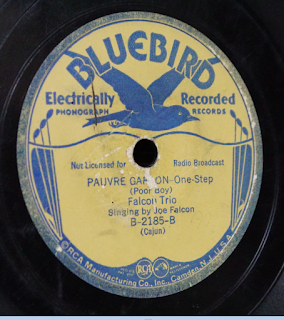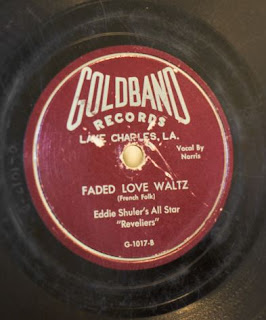He played in a rhythm-heavy syncopated style and sang with a passion unmatched even to this day in Cajun and Creole song.1
Oh, 'coute mes paroles, ye yaille,
Comment, mon je vas faire, mon j'm'en vas,
J'vas faire, j'vas faire, mon j'm'en vas, catin,
Où c'est t'as prender*, malheureuse?
Oh, quoi faire, t'as m'fais ca, maman,
Comment mon je vas faire, mon j'm'en vas,
Mon j'm'en vas, m'en vas à la maison, maman,
Mon cœur fais si mal qu'à jongler.
Oh chère!
Mon j'm'en vas, mes parents, mon j'm'en vas,
Oh, c'est tous les dimanches au soir,
Mais, les samedis, tous les samedis au soir,
Maman, j'après aller pour mon t'voir.
Oh, oh, ye yaille, ye yaille,
J'suis loin d'la maison,
J'connais pas equand je vas m'retourner, ye yaille,
J'm'en vas, mon tout seul, mais, 'tit cœur,
Mes parents veulent pas je reste jamais avec toi,
Quique* (chose), va rester, j'ai pas d'argent.
 |
| Eli Oberstein |
It was one of the first instances of that actually occurring in Cajun music. And it actually is a rare occurrence in pre-war music taken as a whole. But as you can hear from the recordings, they're so perfectly integrated and relaxed with each other.
Oh, listen to my words, ye yaille,
How will I do this, i'm going,
I'm doing this, I'm doing this, I'm going, pretty doll,
Where are you going to go, naughty woman?
Oh, why do you do that to me, little mama,
How will I do this, I'm going,
I'm going, I'm going home, little mama,
Oh, my heart aches thinking about this.
Oh, dear!
I'm leaving my family, i'm leaving,
Oh, it's every Sunday night,
But, the Saturdays, the Saturday evenings,
Little mama, I'm leaving to go to see you.
Oh, oh, ye yaille, ye yaille,
I am so far away at home,
I don't know when I will return, ye yaille,
I'm leaving, all alone, well, little sweetheart,
My parents never wanted me to stay with you,
Whatever, I'm staying, I have no money.
He and fiddle player Dennis McGee recorded "Oberlin", an ode to the small town in Louisiana. Not to be confused with his "One Step de Oberlin", the Texas Hotel session marks another significant development. Although Ardoin had generally established a reputation for playing in a syncopated style more consistent with his Creole legacy than with straight Cajun music, none of his catalog of thirty-four recordings included any percussion instrument accompaniment.2
Portions of the tune resemble Cleoma Breaux's classic recording of "Mon Coeur T'appelle". The greatest legacy of the song would be it's usage as Iry Lejeune's "Te Mone" in the 1950s. According to accordionist Cory McCauley,
In Oberlin, Amédée and Dennis played at a dancehall called The Golden Gate, which was located just south of town. I think this was the last stop on a circuit they would play that would bring them from Châtaignier, Eunice, Basile, Duralde, L'Anse Chaumont, Soileau and Oberlin. I've heard stories of them buying moonshine and sleeping under a tree, staying gone for two weeks at a time. Playing a dance every night. La vie de musicien!5
- http://www.downhomemusic.com/product/amede-ardoin-im-never-comin-back/
- Southeast Texas: Hot House of Zydeco by R. Wood.
- http://www.motherjones.com/mixed-media/2011/03/amede-ardoin-cajun-zydeco-mardi-gras
- https://www.npr.org/templates/transcript/transcript.php?storyId=135638265
- Discussions with Cory M - 6-8-2024
- Lyrics by Stephane F













